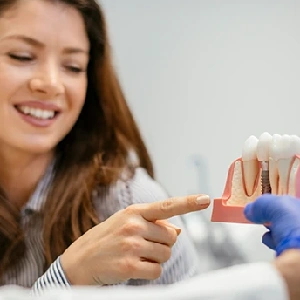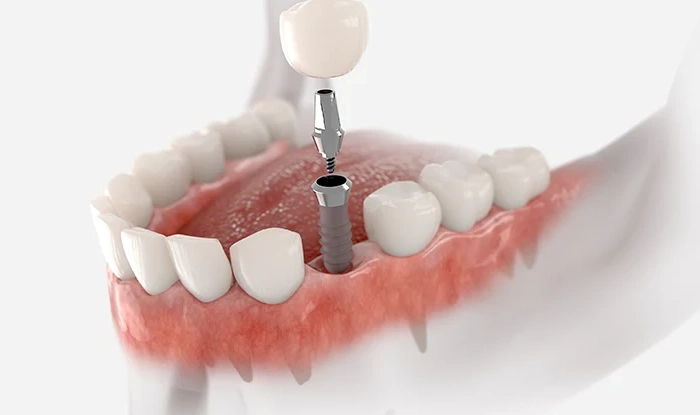Dental implants have revolutionized modern dentistry, offering patients a reliable and natural-looking solution to replace missing teeth. However, while implants boast a high success rate, failures can and do happen. Recognizing the signs of dental implant failure early on is essential for timely intervention and maintaining oral health.
This comprehensive guide will explain dental implant failure, its early and late warning signs, potential causes, and what you can do if you suspect your implant is failing.

What is Dental Implant Failure?
A dental implant is considered successful when it integrates with the jawbone (a process called osseointegration) and functions just like a natural tooth. Implant failure occurs when this process is disrupted or complications arise after the implant has healed.
Failures Can Be Categorized Into
- Early Failure: Occurs shortly after placement, often due to poor healing or infection.
- Late Failure: Happens months or years later, often due to bone loss, infection, or implant overloading.
Understanding the difference helps identify issues at different stages of the implant’s lifespan.
Common Signs of Dental Implant Failure
- Pain and Discomfort: While mild discomfort is normal after surgery, persistent or severe pain is a red flag. If pain continues weeks after placement or worsens over time, it may indicate implant failure.
- Swelling and Inflammation: Peri-implantitis, inflammation of the gums surrounding the implant, can lead to bone loss and implant instability. Red, swollen, and bleeding gums are warning signs.
- Difficulty Chewing or Biting: A properly integrated implant should feel like a natural tooth. If you experience difficulty chewing or biting or feel the implant shifting, this could indicate failure.
- Gum Recession Around the Implant: Receding gums can expose the metal post of the implant. This affects aesthetics and can compromise the implant’s stability and health.
- Loose or Shifting Implant: One of the clearest signs of implant failure is movement. A healthy implant should be immobile. If it becomes loose, immediate dental evaluation is necessary.
- Pus or Discharge: Pus or discharge from the implant site is a sign of infection. If not treated promptly, infection can threaten the surrounding bone and tissue, leading to implant failure.
- Allergic Reactions: Though rare, some patients may experience allergic reactions to the titanium alloy in implants. Signs include swelling, tingling, or a burning sensation around the implant site.
- Sinus Issues (For Upper Implants): Implants placed in the upper jaw can fail if they protrude into the sinus cavity, causing sinus problems. Symptoms may include pain, pressure, or infection.
What Causes Dental Implants to Fail?
Understanding the underlying reasons helps patients and dentists prevent and manage implant failures more effectively.
- Poor Oral Hygiene: Inadequate care can lead to peri-implantitis, a bacterial infection that affects the gum and bone supporting the implant.
- Insufficient Bone Density: Integration may fail without enough bone to anchor the implant securely.
- Smoking and Tobacco Use: Smoking reduces blood flow, slows healing, and increases the risk of infection and implant failure.
- Medical Conditions: Diabetes, osteoporosis, and autoimmune disorders can interfere with healing and increase the risk of failure.
- Implant Overloading: Excessive force on the implant from teeth grinding (bruxism) or improper placement can lead to failure.
- Surgical Errors: Poor placement technique or contamination during surgery can prevent proper osseointegration.
What to Do If You Notice Signs of Dental Implant Failure?
- Schedule a Dental Evaluation: Contact your dentist immediately if you notice any warning signs. Early intervention can prevent complete failure and may save the implant.
- Professional Cleaning and Infection Control: In cases of infection, deep cleaning and antibiotics may be prescribed to stop the spread and stabilize the implant.
- Bone Grafting or Soft Tissue Grafting: If bone loss is evident, bone grafting may be necessary to restore support for the implant.
- Replacement Options: If the implant cannot be saved, your dentist may discuss replacing it or exploring alternative restorative solutions.
How Centers for Dental Implants Can Help?
At Centers for Dental Implants, our experienced team is dedicated to ensuring the long-term success of your dental implants. We provide comprehensive care, from implant planning and placement to post-operative follow-ups and management of complications.
Do not hesitate to reach out if you suspect any signs of dental implant failure. Early diagnosis and treatment can make all the difference in protecting your oral health and restoring your confident smile.
Final Thoughts
While dental implants offer a highly effective solution for tooth replacement, it is essential to be aware of the signs of implant failure. At Centers for Dental Implants, we prioritize your oral health and implant success with expert guidance and compassionate care. Contact us today if you notice any symptoms or have concerns about your implants.
Call us today or Book your consultation at one of our three Florida locations: Aventura, Hallandale Beach, or Pembroke Pines.
FAQs
How common is dental implant failure?
Dental implants have a success rate of about 95%. Failure, though rare, can occur due to various factors, such as infection, poor oral hygiene, or medical conditions.
Can a failed dental implant be replaced?
Yes, failed implants can be removed in many cases, and a new implant can be placed after sufficient healing and bone grafting.
How long do dental implants last?
With proper care, dental implants can last 20 years or more. Regular dental visits and good oral hygiene are crucial for longevity.
What should I do if my implant feels loose?
Contact your dentist immediately. A loose implant may indicate bone loss or failure and needs prompt evaluation.

